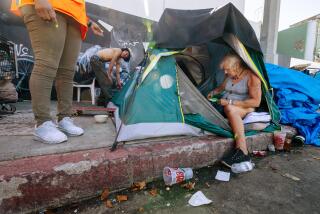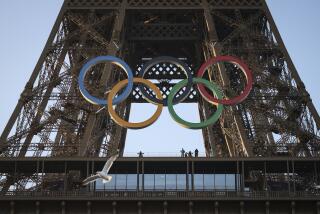Olympian Effort to Handle Homeless
SALT LAKE CITY — Construction worker Michael Fletcher arrived here from Idaho with hopes of finding work in the Olympic economy but instead is standing in a soup kitchen line.
Fletcher is among the city’s new homeless, a population that is expected to increase by 20% during next month’s Winter Games. Some, such as Fletcher, came searching for Olympic employment. Others have lost their jobs, victims of the recession and terrorism’s toll on the tourist economy. Still others were evicted from their motels and apartments by landlords who are bumping up rents to profit from the Olympics.
The homeless huddling in the cold for food and shelter present an image an Olympic city might strive to cloak. Salt Lake City is putting on its finest civic face--erecting fanciful public art and hanging huge banners from the sides of buildings depicting athletes in competition. Downtown especially glistens at night when trees decorated with white lights shimmer against the fresh snow.
Yet as the city prepares to take the world spotlight Feb. 8, it is proving as hospitable to the down-and-out as it is to the moneyed.
Fletcher is receiving shelter and food in a complex of homeless service providers fully visible to tourists visiting downtown’s newest upscale shopping complex. He received a voucher for a new pair of work boots and was given a bus pass so he could look for a job.
The city has gathered hundreds of volunteers to help the homeless and last week opened a new emergency homeless shelter--not in some distant suburb but just a few blocks from where the figure skaters and ice dancers will compete.
It’s the first time, officials say, that an Olympic host city has added an emergency shelter--with 450 beds--to accommodate the expected overflow of homeless people.
The opening of the shelter--financed with city, county and state funds--stands in contrast to Atlanta, where in advance of the 1996 Summer Olympics, police arrested 10,000 homeless people. Homeless advocates complained that the tactics were intended to scare the homeless away or cajole them to lay low during the Games. Officials there also offered free one-way bus tickets under a clean-the-streets program euphemistically called, “Project Homeward Bound.”
Salt Lake City instead is putting out the welcome mat. “We respect the human and civil rights of everyone, including the homeless, during these Olympics,” said Mayor Rocky Anderson, a former attorney for the American Civil Liberties Union. “We won’t be doing roundups or anything like that. This community is very caring toward the homeless.”
The ACLU said it has received no complaints of mistreatment from homeless people.
The city and the surrounding county have a long, established history of caring for the homeless. A coalition of 40 public, private, church and charitable organizations tend to an estimated 2,500 homeless people who live here.
It’s now bracing for as many as 500 more, said Sheila Walsh-McDonald, chairwoman of the Salt Lake County Homeless Coordinating Council.
“We think we’re going to be the first Olympics city to be prepared to handle the homeless,” she said.
Salt Lake City is hardly a target for the migrating homeless, given its cold winters and Utah’s tightfisted welfare system. Its homeless population is relatively small, in part because the Church of Jesus Christ of Latter-day Saints, whose members make up 70% of Utah’s population, admonishes its followers to be responsible for themselves and, if they run into financial crises, to turn first to family before seeking church or civil assistance.
But not everyone has family to turn to. Robert Aldrich, 45, lost his job in October as a food and beverage director at an upscale hotel in Park City, 30 miles southeast of here. Business there plummeted after the Sept. 11 terrorist attacks on New York City and the Pentagon.
With no paycheck and dwindling savings, he moved from a mountain rental condominium to a Salt Lake City house he shared with two other men. He got a part-time telephone job for $8 an hour. Unable to make his rent, he now sleeps in his car.
“This town is a piece of cake to be homeless in,” he said while waiting for lunch at the St. Vincent de Paul center, known locally as St. Vinny’s. “We’re almost coddled. I’m getting three meals a day, and I could get six if I wanted. There aren’t any skinny homeless people in Salt Lake.”
Lynette Phillipsen’s take on Salt Lake City was less sunny. Phillipsen, 50, arrived in town 10 days ago from Arizona with $11 in her purse. She ended up at the Road Home, the city’s largest homeless shelter. “I think it’s cruel, the way the homeless are treated here,” she said. “The shelters don’t have kitchen facilities, and to eat you’re treated like cattle--coming in two at a time.”
Fletcher, 53, came here hoping for an $18-an-hour job hanging drywall. Instead, he’ll earn $8 an hour attending an Olympic park-and-ride facility, not enough to pay for an apartment. After the Olympics, he said, he’ll probably take his job hunt to Denver.
Linda Hamilton, who chairs the Humanitarian Services Committee of the Salt Lake Organizing Committee, said untold numbers of construction workers have flocked here because of construction slowdowns elsewhere.
“I talked to eight carpenters who showed up here from Las Vegas assuming there’d be jobs here,” she said. “They told me more were headed this way.”
The city is most sympathetic to those who have lost affordable housing because their landlords evicted them to rent rooms to visitors at higher rates during the Games.
“Nobody should be profiting during the Olympics at the expense of persons needing affordable housing,” Anderson said.
At Zion’s Motel, along the street that leads directly to the state Capitol, owner John Purdue evicted the tenants of his two dozen units on Jan. 15--including those who were paying $220 a week--and raised the rates to $105 a night.
“We’re anticipating being very busy,” he said.
Of the people he evicted, Purdue said: “We’re a for-profit business. We’re not a charity. . . . We’re sympathetic [toward the homeless], but this is a supply-and-demand world.”
Homeless advocates say they’ve heard of similar evictions at low-income apartments--and are helpless to stop it. Utah law allows landlords to evict month-to-month tenants without cause with just a 15-day notice. “Salt Lake City has the fastest evictions in the West,” said Marty Blaustein, a housing attorney for Utah Legal Services. “And residents who live in some awful conditions are being evicted so the owners can rent those units sight-unseen for $250 to people coming here from out of state.”
Although the Olympics can be partly blamed for increasing the number of homeless, the Games also are helping to feed them. Hilton’s humanitarian committee arranged for Olympic food vendors--who provide box lunches to athletes, volunteers and others on the slopes and in the arenas--to return unopened ones daily for distribution to the city’s soup kitchens.
Because of the increased need for volunteers, the federal government dispatched 250 of its AmeriCorps volunteers to help.
As men and women enter the new emergency shelter, the volunteers fill out admission forms and politely but firmly check bags for weapons, drugs and alcohol.
Once admitted, the homeless walk across the concrete floor and claim a cot, laid out in sharp, straight rows in the middle of the cavernous room. At dinner, they walk to the Salvation Army hall, which serves as many as 500 meals nightly and is gearing up to serve 1,000 during the Olympics.
“We anticipate a lot more people who need assistance will be coming to town during the Games,” said Wayne Froderberg, a major with the Salvation Army. “We have a compassionate network of providers. We want to be good hosts to all who come here.”
More to Read
Go beyond the scoreboard
Get the latest on L.A.'s teams in the daily Sports Report newsletter.
You may occasionally receive promotional content from the Los Angeles Times.






